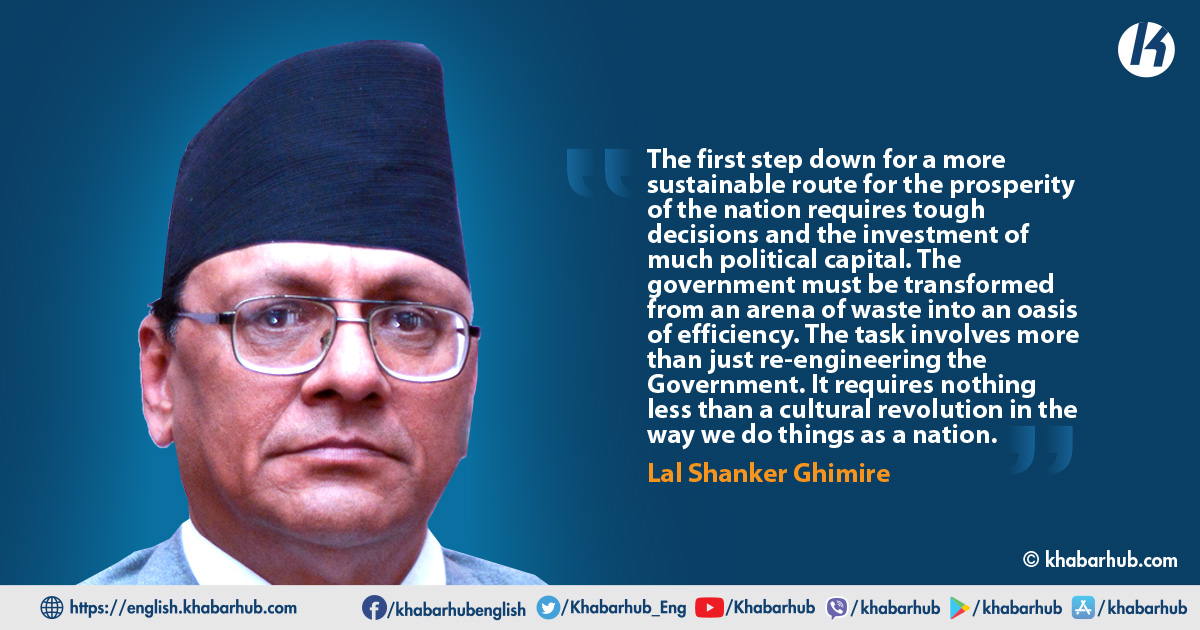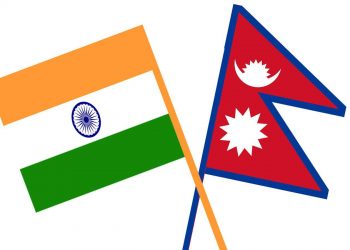There are no numerical and quantitative targets mentioned in the announced Common Minimum Program (CMP), meaning that it will not be yet relevant to talk about achieving results or the performance to measure against the key performance indicators (KPIs) or targets.
In this context, what would perhaps be reasonable is to look at: would it be possible for the ruling alliances /coalitions to fully and effectively implement the CPM, and how?
This question has been the focus of people’s gossips; social media and media chatter in the afterglow of the CMP agreed amongst the ruling coalitions of the recently formed Government of Nepal, and made officially public on 8 August 2021.
Some media, members of the political parties and intellects seem haggard on determining the lowest common denominator of public discourse: the protagonist and the personalities in the drama of history.
The Government already has many challenging agendas for the country for implementation within a short period, a maximum of one and half years.
The challenges include saving Nepali from corona, economic recovery, addressing the vulnerable, ensuring rule of law, smoothening supply and guaranteeing service delivery, completion of the post-earthquake reconstruction, participation in global agenda, especially climate change, and a few others.
Furthermore, the institutionalization of a federal system of governance, exponential socio-economic transformation and progression, judicious access to resources and opportunities, and additional support to poverty alleviating and human development programs by enhancing economic activities and creating mass employment opportunities through economic reform and investment promotions are also all-time challenging agenda.
Our bureaucracy, especially the higher tier, is not only self-defeating and keeps multiple political-partisan id cards to change oneself easily when the ruling party is changed but is also neglected by the politics, untrusted by the people at service receiving end, and non-cooperating from lower tier. Here lies the core of the challenges.
While CMP remains circled around these challenges, at the same time it has been an additional challenge and agenda for the Government.
No matter which political parties or what combination of coalition run the Government, our experience suggests that it is much easier to grow the economy, if there were no corona and corona-like effects, by deficit spending.
This is precisely the easy route we followed in the past, borrowing heavily both from the domestic market especially from the banking sector, and from abroad as foreign assistance to ‘pump prime’ the domestic economy and burying us deeper in debt.
That was an easier route because it pandered to public expectations for dole-outs and subsidies while avoiding public aggravation over additional revenues measures.
This is why Nepal is the least developed, and one of the poorest countries in the world for years, the least taxed (nearly half of the economy being informal as per the Economic Census undertaken by the Central Bureau of Statistics under the National Planning Commission in 2018) and the indebted.
The more difficult but immensely wiser route is the CPM agreed amongst coalition partners and made public by the Government.
The CMP has come up with a preface of 5 paras. It has also identified 11 priorities – protecting citizens from covid-19; constitutional supremacy, rule of law and governance; peace process and the implementation of agreements with different parties; amendment of the constitution; strengthening federalism; socio-economic transformation including high and equitable growth; productive economy, supply management and corruption control; reliefs to all sectors of the economy, including poor and vulnerable affected by covid-19; support to victims of landslides, floods and submerging; independent and balanced foreign policy; and strengthening of national unity.
Similarly, some 10 policies and programs (winning covid-19 pandemic, promotion of national interests, implementation of federalism and strengthening democratic republic, guaranteeing law and order and the governance, completion of the peace process, economic policy and program, social transformation, immediate relief, reconstruction and rehabilitation, ecological balance, and international relations) of the coalition Government. That/ this is understandable.
The first step down for a more sustainable route requires tough decisions and the investment of much political capital.
The government must be transformed from an arena of waste into an oasis of efficiency. Subsidies must be withdrawn, ghost expenditures and conspicuous consumption within the Government cuts, and social supports and other allowances more tightly targeted.
Market discipline must be made to apply to public enterprises and private sector benchmarks of efficiency are employed in the bureaucracy. Above all, the revenue system must finally work efficiently so that Government may expand social services and economic investments
In this context, the real question is not whether the government led by Prime Minister Mr. Sher Bahadur Deuba is up to the job it set for.
The real question is whether we have the institutional capacity to do what has to be done to set our national destiny right.
One cannot agree on or about the definition of institutional capacity as it is dimensional in nature and influenced by various factors such as culture, technology, level of economic development, social values, and so on.
An idea and clear thinking, however, can be developed. In other words, institutional capacity includes the context in which both organization and the administration operate.
In our country, however, institutional capacity is not difficult to imagine. For example, if your car stalls because of some mechanical troubles, you cannot make it run by kicking the tires or by cursing the vehicle. If you have a small engine displacement, you cannot do what a Formula One racing machine could do.
We can, at the risk of oversimplifying, imagine our whole apparatus of governance as a mechanical system. The various institutions that compose it have varying capacities to accomplish their respective tasks or missions.
Sometimes, as in the case of bantam cars manufactured by Slack and Harrison in 1913 in the United Kingdom, they are designed to accomplish things less grand than what we might now expect them to do.
Many of our institutions are flawed, no doubt. And, at the same time, our political culture is flawed as well. Bureaucracy is never praised nor famous for initiating changes.
The bureaucracy is inclined to reproduce old ways of doing things – especially a bureaucracy so ill compensated and demoralized as ours, one that has for many years list its zest for excellence.
Our bureaucracy, especially the higher tier, is not only self-defeating and keeps multiple political-partisan id cards to change oneself easily when the ruling party is changed but is also neglected by the politics, untrusted by the people at service receiving end, and non-cooperating from lower tier. Here lies the core of the challenges.
The historical juncture, we find ourselves in, requires grand responses. In order not to sink further into debt, frustration, chaos and underdevelopment, and not be known as fragile and failed states, we must dramatically improve our ability to raise revenues, drastically reduce dependency on foreign aid, and mobilize human and other resources abundantly available within our country, within our reach.
In order not to sink deeper into poverty and vulnerability, Government must waste less and deliver more. We need to accomplish all these in the shortest of timeframes. And we must accomplish all these within a popular culture that instinctively gazes at its navel in the face of large challenges.
Our political system has a long-honored tradition of gridlock. In the name of “checks and balances”, we have cultivated a political culture of obstructionism, which we also call “fiscalization”.
Our institution and our culture might not be prepared to meet the challenges of setting things right head-on. The partisan white noise that was ensured after the CMP was disclosed seems to indicate that. However, it will be such an act of defeatism to concede now that we could not hack it- and therefore should allow ourselves to be drawn helplessly down to the historical drain.
Our political parties are not organized to deliver political support to the leadership’s policies. Instead, many people think that they look organized to divide the spoils and spread the loot!
Our public sector, after many years of politicization, has developed complex coping mechanisms that make our agencies not only immune to interference but also resistant to policy direction. Sometimes, it seems that getting our agencies to support leadership goals is like “ordering the waves to still”.
This is the environment within which the ruling coalitions need to try what perhaps can no longer be postponed: the sweeping and radical renovation of our whole idea of governance so that this becomes an asset rather than an impediment to our progress.
The task involves more than just re-engineering the Government. It requires nothing less than a cultural revolution in the way we do things as a nation.
The window of opportunity will quickly close on us before we feel we are ready to meet the challenges head-on. The fiscal situation is deteriorating, due partly to corona, much more quickly than we would prefer, and soon we could find ourselves truly desperate.
Our institution and our culture might not be prepared to meet the challenges of setting things right head-on. The partisan white noise that was ensured after the CMP was disclosed seems to indicate that. However, it will be such an act of defeatism to concede now that we could not hack it- and therefore should allow ourselves to be drawn helplessly down to the historical drain.
Someone should stand up there and say we can do it. And, that was precisely what the ruling coalition perhaps decided or tried to do.
From here on, the Prime Minister must be more than just a leader and all other ministers more than just deputies. They must be cheerleaders to the nation and drive the inertia of many years of refusal to do anything of any real value and undertake very important steps for changing the path of our progress and prosperity.
(Mr. Ghimire a senior Government Officer retired in 2019, and frequently writes on socio-economic and development issues)









Comment